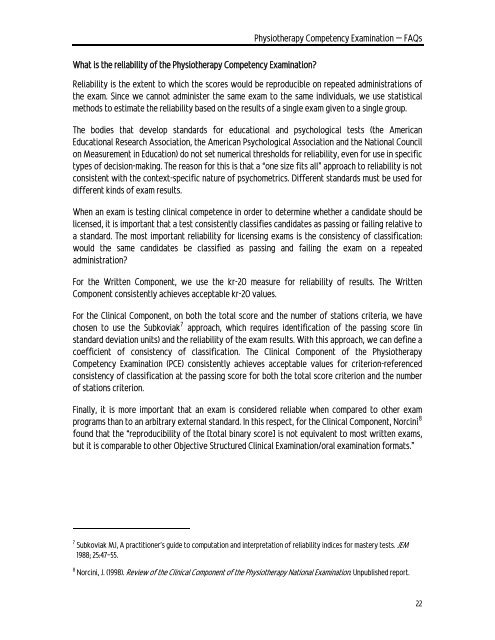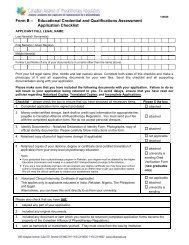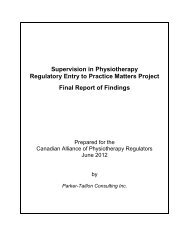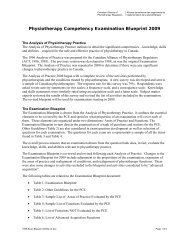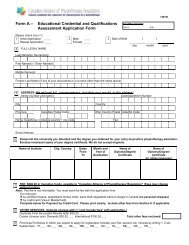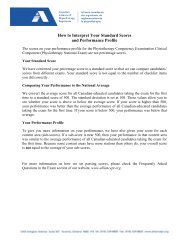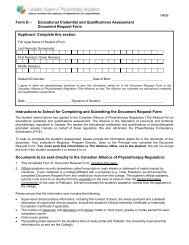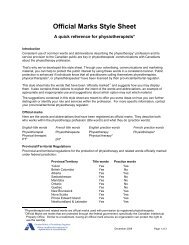Frequently Asked Questions - Canadian Alliance of Physiotherapy ...
Frequently Asked Questions - Canadian Alliance of Physiotherapy ...
Frequently Asked Questions - Canadian Alliance of Physiotherapy ...
Create successful ePaper yourself
Turn your PDF publications into a flip-book with our unique Google optimized e-Paper software.
<strong>Physiotherapy</strong> Competency Examination — FAQs<br />
What is the reliability <strong>of</strong> the <strong>Physiotherapy</strong> Competency Examination?<br />
Reliability is the extent to which the scores would be reproducible on repeated administrations <strong>of</strong><br />
the exam. Since we cannot administer the same exam to the same individuals, we use statistical<br />
methods to estimate the reliability based on the results <strong>of</strong> a single exam given to a single group.<br />
The bodies that develop standards for educational and psychological tests (the American<br />
Educational Research Association, the American Psychological Association and the National Council<br />
on Measurement in Education) do not set numerical thresholds for reliability, even for use in specific<br />
types <strong>of</strong> decision-making. The reason for this is that a “one size fits all” approach to reliability is not<br />
consistent with the context-specific nature <strong>of</strong> psychometrics. Different standards must be used for<br />
different kinds <strong>of</strong> exam results.<br />
When an exam is testing clinical competence in order to determine whether a candidate should be<br />
licensed, it is important that a test consistently classifies candidates as passing or failing relative to<br />
a standard. The most important reliability for licensing exams is the consistency <strong>of</strong> classification:<br />
would the same candidates be classified as passing and failing the exam on a repeated<br />
administration?<br />
For the Written Component, we use the kr-20 measure for reliability <strong>of</strong> results. The Written<br />
Component consistently achieves acceptable kr-20 values.<br />
For the Clinical Component, on both the total score and the number <strong>of</strong> stations criteria, we have<br />
chosen to use the Subkoviak 7 approach, which requires identification <strong>of</strong> the passing score (in<br />
standard deviation units) and the reliability <strong>of</strong> the exam results. With this approach, we can define a<br />
coefficient <strong>of</strong> consistency <strong>of</strong> classification. The Clinical Component <strong>of</strong> the <strong>Physiotherapy</strong><br />
Competency Examination (PCE) consistently achieves acceptable values for criterion-referenced<br />
consistency <strong>of</strong> classification at the passing score for both the total score criterion and the number<br />
<strong>of</strong> stations criterion.<br />
Finally, it is more important that an exam is considered reliable when compared to other exam<br />
programs than to an arbitrary external standard. In this respect, for the Clinical Component, Norcini 8<br />
found that the “reproducibility <strong>of</strong> the [total binary score] is not equivalent to most written exams,<br />
but it is comparable to other Objective Structured Clinical Examination/oral examination formats.”<br />
7 Subkoviak MJ, A practitioner's guide to computation and interpretation <strong>of</strong> reliability indices for mastery tests. JEM<br />
1988; 25:47–55.<br />
8 Norcini, J. (1998). Review <strong>of</strong> the Clinical Component <strong>of</strong> the <strong>Physiotherapy</strong> National Examination. Unpublished report.<br />
22


